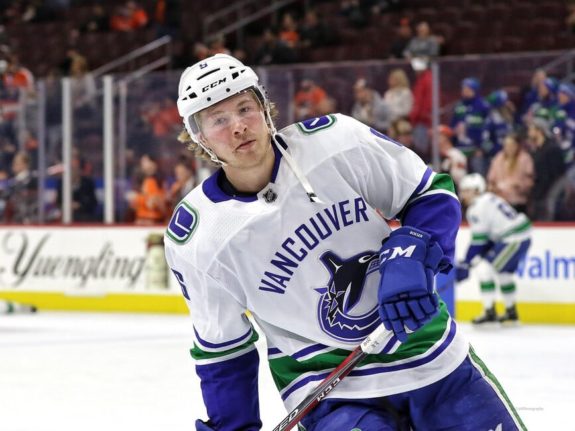The Vancouver Canucks and Brock Boeser have come to terms on a three-year contract worth $17.625 million. The deal carries an annual cap hit of $5.875 million.
“We’re very pleased to have Brock re-sign,” said general manager Jim Benning. “He’s a talented player, a key contributor to our offence and an important part of our team’s future. We look forward to having Brock join the team in preparation for the upcoming season.”
The 22-year-old Boeser was a finalist for the Calder Trophy in his rookie season and has been one of the most exciting young players in the NHL since making the jump to the league out of the University of North Dakota.
In his first nine games, all coming in the 2016-17 season, Boeser would score an impressive four goals and five points. He’d prove that his goal-scoring prowess wasn’t just a fluke as he’d score 39 goals and 55 points in 62 games in his rookie season the following year.
He’d tack on another 26 goals and 56 points in 69 games in his sophomore season.

While the Canucks immediate future doesn’t look promising, their long-term future has a lot of potential with young stars like Boeser, Elias Pettersson, Quinn Hughes, Vasili Podkolzin and more all primed to be major parts of the team’s core.
For both the Canucks and Boeser, this deal makes a lot of sense. The short-term bridge deal gives Boeser the opportunity to earn a significant raise on his rookie deal while still having the opportunity to cash in on an even bigger deal down the line.
For the Canucks, the three-year deal allows them to maintain Boeser’s RFA rights at the conclusion of the contract, giving them leverage when signing him to his next deal. At this rate, however, it’s unlikely that Boeser will sign for anything less than top-dollar once this bridge deal expires.
Boeser Joining Other Recently Signed RFAs
With training camps and the preseason starting around the NHL, many of the unsigned restricted free agents in the league have come to terms on new deals with their respective teams. Some, like Boeser, Charlie McAvoy and Zach Werenski, would work out bridge deals with their teams.
Related: Bruins Re-Sign McAvoy
Others like Mitch Marner, Ivan Provorov, Josh Morrissey and Travis Konecny would cash in on longer deals ranging from six to eight years each.
It’s unsurprising to see so many of these players come to terms on new deals now that training camps are underway, but it’s certainly interesting to monitor the sheer number of top-tier RFAs remain on the market as of Boeser signing.
Players like Brayden Point, Patrik Laine, Mikko Rantanen, Matthew Tkachuk, Kyle Connor, Brandon Carlo and others remain unsigned and in search of new deals. While many will undoubtedly sign bridge deals like Boeser’s, there’s a good chance that at least one more from this crop of RFAs cashes in on a long-term deal in the present.
Gone are the days where RFAs are expected to sign bridge deals. In today’s NHL, it’s sometimes wiser to sign young players to a bigger deal early to avoid any increased costs due to inflation of the salary cap and other comparable deals that raise the asking price across the board.